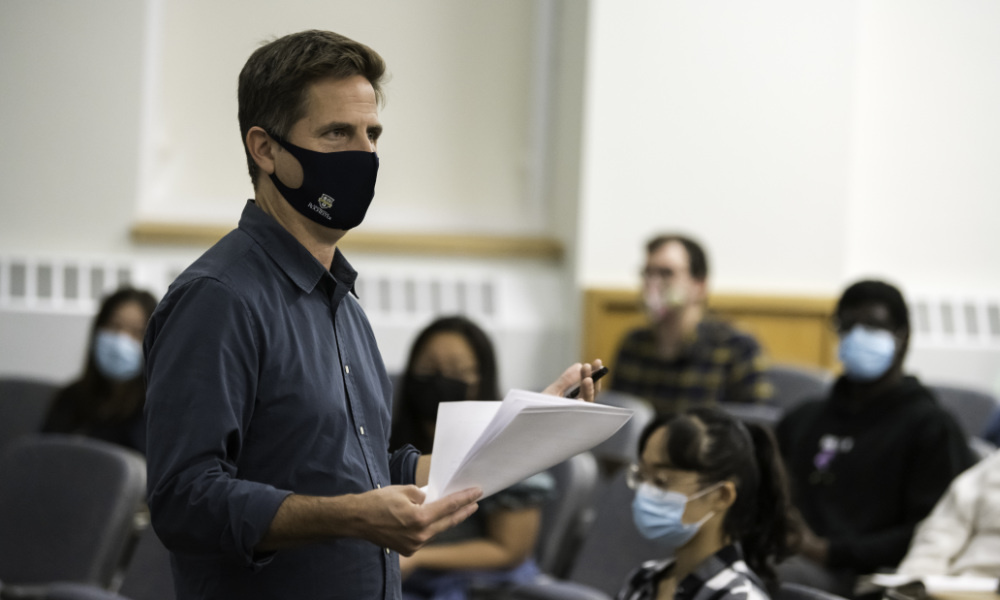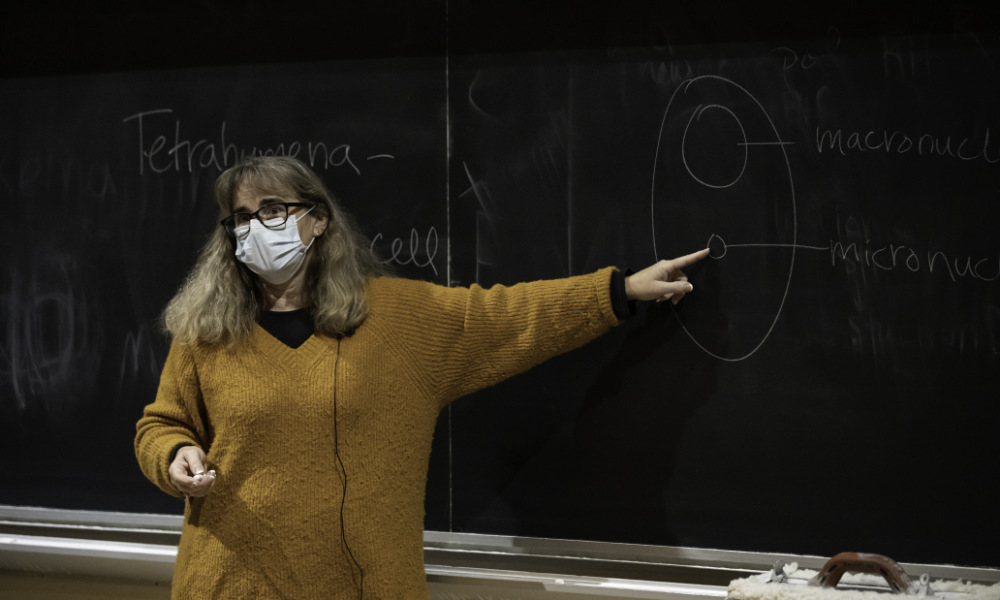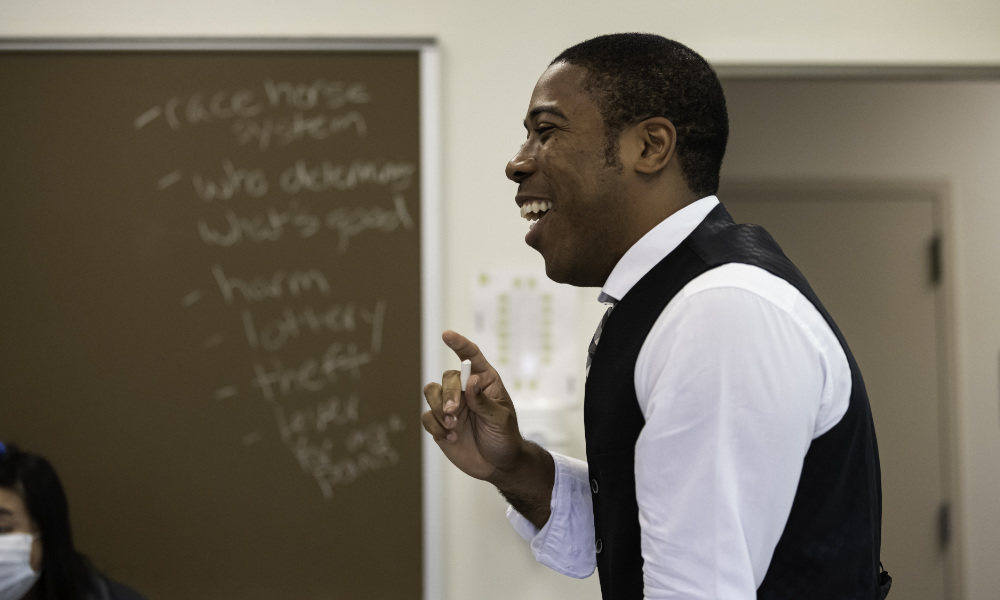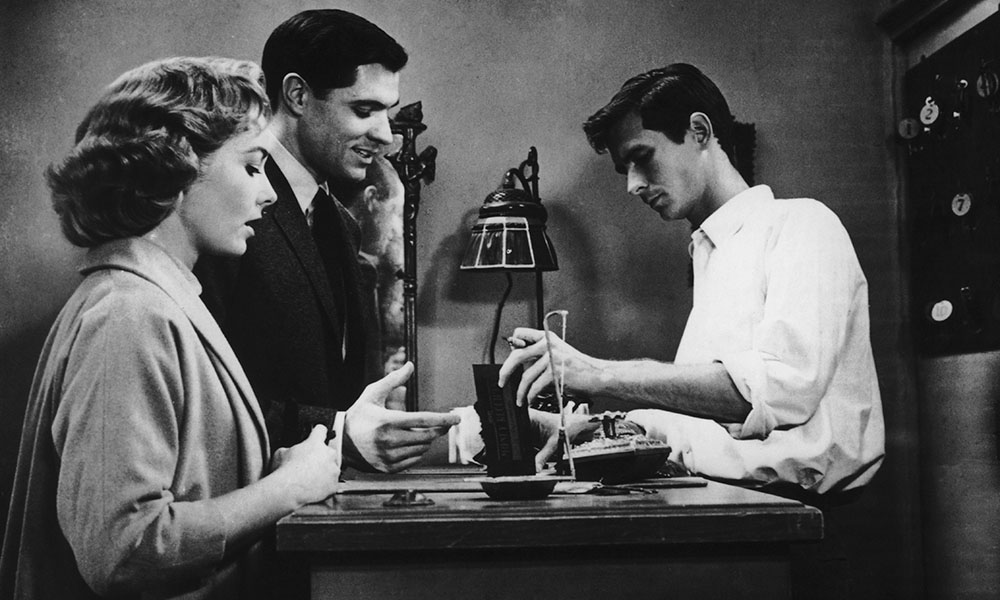
What they’re saying
“Every year, Jason Middleton teaches his renowned course, Introduction to the Art of Film, to a group of 80 undergraduates, helping them to become active and critical consumers of the visual messaging they encounter each day. The most common refrain in Jason’s teaching evaluations? ‘I will never look at a film the same way after taking this course.’ ”
—Katherine Mannheimer, chair, Department of English
“Professor Middleton modeled an academic generosity, mentorship, and rigor that inspired my own identity as a scholar, and that I strive to impart to my students. I frequently draw inspiration from his pedagogical excellence, especially in crafting online discussions, integrating illustrative film clips into lectures, and fostering a supportive, open classroom environment.”
—Eleni Palis ’12, assistant professor of cinema studies, University of Tennessee
“Serving as a teaching assistant for Jason was a great privilege.
He regularly sought our input about curriculum and saw us as individuals who could be future colleagues. Rather than ‘throw us in the deep end,’ he spent several hours helping us prepare our materials to ensure that we were able to get in the right mindset for teaching a class with over 100 students. During the session I taught, he sat among the students and subtly helped keep the classroom dialogue going. I’m forever grateful for how seriously Jason took his role as mentor.”
—Eitan Freedenberg ’20 (PhD)
From Citizen Kane to The Graduate, students analyze all aspects of impactful movies, documentaries.
Because of his father’s ever-evolving career in education and development, Jason Middleton lived all over the globe growing up: Hawaii. Indonesia. Malaysia. Vermont. The District of Columbia.
He visited other worlds through his passion for films such as the Star Wars trilogy and Close Encounters of the Third Kind.
“I loved fantasy and science fiction, and I got into horror films at an early age,” he says. “But I never dreamed I would be teaching about film for a living.”
Middleton, who earned his PhD in the literature program at Duke University, has been at the University of Rochester since 2007 and is an associate professor of English and visual and cultural studies while also serving as director of the Film and Media Studies Program.He has explored such genres documentary, music video, film and television comedy, and horror, and done so through a range of lenses including feminism. His popular class Introduction to the Art of Film is capped at 80 students, who have delved into classics such as Citizen Kane, The Graduate, Blade Runner, and Do the Right Thing, breaking films down through analyses of camera angles, framing, lighting, sound, and closeups.
Middleton says there are many films he loves but has never taught. “They don’t serve a pedagogical function,” he says. On the other hand, “I never teach about a film I don’t like. The ones I choose are engaging and compelling works of art.”
For a unit on cinematography, he uses Spike Lee’s Do the Right Thing. “There is so much to discuss about race and political issues,” he says. “And the famous tense scene in the pizza shop is made palpable by the use of wide-angle lenses.”
He analyzes The Graduate during his week on sound, and asks his class to interpret the ambiguous ending, in which the faces of Benjamin and Elaine change from elated to stoic.
“There’s no single right interpretation, but some are better than others,” says Middleton. “You can understand Benjamin’s expression on the bus better if you relate it to his face on the plane in the opening scene, or when he’s alone in his room staring at his fish tank, or with Mrs. Robinson in the hotel.”
Students have praised Middleton for making a large class feel small, and his lectures follow a routine: He’ll introduce a specific idea, use a clip to illustrate that idea, then ask his students to interpret the scene. “I provide enough so you don’t get the dreaded silence, but not so much that there’s only one answer,” he says. “Once you hit the sweet spot, the energy builds on itself.”
John Michael, a professor in the Department of English and for the Graduate Program in Visual and Cultural Studies, was chair of the English department when Middleton joined the University in 2007. He says Middleton’s career has been “something of a phenomenon.”
“While his personal style is rather low-key, he develops a remarkable dynamism in the classroom,” Michael says. “He does this without pandering to students, catering to their whims, or fostering a false atmosphere of informal collegiality. He’s a seriously demanding teacher who insists that his students rise to the challenge of his meticulously prepared classes.”
With his large enrollments, Middleton has access to teaching assistants and will sit among the students and subtly keep a strong dialogue going with thoughtful questions. He says his goal in class is to “teach students to watch film with a critical eye, and always stay innovative,” whether it’s in an introductory course for undergraduates or a graduate class.
Middleton hopes students remember what they’ve learned about film long after the leave the University. “When you’re a doctor in your 40s and you’re watching a movie with your kids, I hope you’ll appreciate the artistry of it, or recognize things that are problematic about it,” he says. “I hope they always look at film with a critical eye.”





